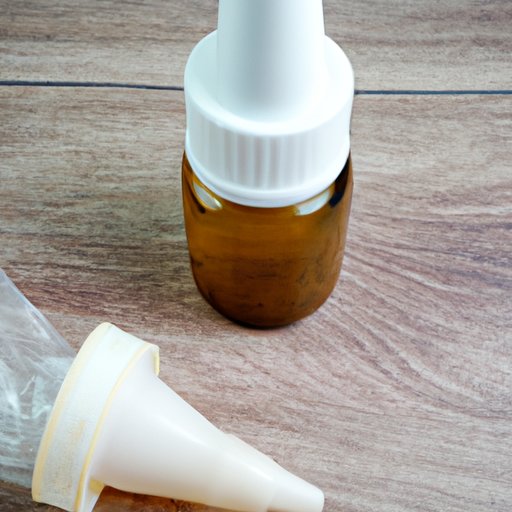
Introduction
Waking up with a stuffy nose can be a frustrating and uncomfortable experience. It can affect your ability to breathe freely, concentrate, and sleep well. If you experience this frequently, it is essential to discover the underlying causes and take steps to prevent it from happening. In this article, we will explore some tips and tricks to prevent a stuffy nose in the morning and improve your quality of life.
Stay Hydrated
The importance of drinking water is crucial, especially before bedtime. Drinking enough water can help keep your body hydrated and prevent your nasal passages from drying out. When your nasal passages are dry, it can lead to congestion, making it difficult to breathe. Therefore, it’s a good idea to drink a glass of water before bed and keep a glass of water nearby throughout the night to stay hydrated.
Another way to keep nasal passages moist is by using a saline nasal spray. It’s a natural way to hydrate the nasal passages, and it helps to thin out the mucus, making it easier to clear.
Elevate Your Head
If you are experiencing nasal congestion in the morning, try elevating your head while sleeping. Sleeping with your head elevated can help keep the nasal passages open and prevent congestion. When you sleep with your head flat, mucus can build up in your nasal passages, leading to congestion in the morning. By elevating your head, you can prevent this from happening.
There are several ways to elevate your head while sleeping. You can use a wedge pillow, which is designed to support your head and neck while keeping your upper body elevated. Alternatively, you can use an adjustable bed that allows you to adjust the height of the bed’s head.
Humidify the Air
Dry air can worsen nasal congestion, so adding humidity to the air can help relieve congestion. Using a humidifier in your bedroom can help add moisture to the air, which can keep your nasal passages moist and soothe irritation caused by dry air.
There are different types of humidifiers you can use, such as warm mist, cool mist, and ultrasonic humidifiers. Each type of humidifier has its benefits and drawbacks, so it’s important to research each one before selecting a particular model.
When using a humidifier, it’s essential to clean it regularly to prevent bacteria and mold growth, which can make allergies worse.
Keep the Room Dust-Free
Dust and allergens can exacerbate nasal congestion, so it’s crucial to keep your bedroom as clean and dust-free as possible. Dust your room and furniture regularly, including vacuuming carpets and washing your bedding frequently. Additionally, consider using hypoallergenic bedding and air filters to reduce allergens in the bedroom.
Another way to reduce allergens is to keep pets out of the bedroom since pet dander can contribute to nasal congestion and allergies.
Use Saline Nasal Spray
Saline nasal sprays are a natural and effective way to relieve nasal congestion, especially if you’re experiencing congestion in the morning. Use a saline nasal spray before bedtime to hydrate your nasal passages and loosen mucus. It’s a gentle way to clear your nasal passages, making it easier to breathe.
Be sure to follow the instructions on the nasal spray and use it as directed. Also, check with your doctor first before using a saline nasal spray, especially if you have any medical conditions or are taking any medications.
Avoid Irritants
Many irritants can cause nasal congestion, such as cigarette smoke, strong perfumes, cleaning products, and outdoor pollutants. Try to reduce your exposure to these irritants as much as possible, especially in your bedroom. Avoid smoking and keep your bedroom well-ventilated to circulate the air.
You can also opt for natural cleaning products to reduce harsh chemicals in the bedroom and avoid using perfumes or colognes with strong scents.
Conclusion
Preventing a stuffy nose in the morning is essential to improve your quality of life and sleep. By staying hydrated, elevating your head, humidifying the air, keeping the room dust-free, using saline nasal spray, and avoiding irritants, you can reduce the likelihood of experiencing nasal congestion in the morning. It’s also essential to address any underlying medical conditions with your doctor and explore additional treatment options if necessary. Remember, these tips are simple and effective steps toward a better morning, every day.




